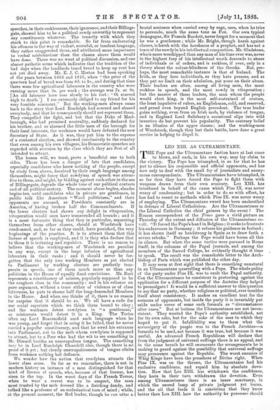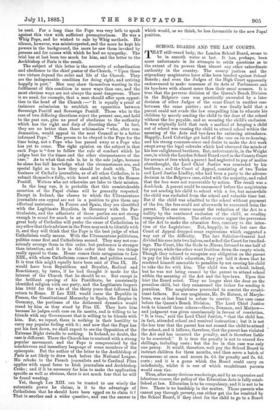LEO XIII. AS ULTRAMONTANE.
THE Pope and the Ultramontane faction have at last come to blows, and each, in his own way, may lay claim to the victory. The Pope has triumphed, in so far that he has put to silence his responsible and official opponents, and has now only to deal with the small fry of journalists and anony- mous correspondents. The Ultramontanes have triumphed, in so far that they have forced the Pope to fight them with weapons drawn from their own armoury. Leo xrfr. has interfered in behalf of the cause which Pius IX. was never weary of condemning ; but in order to do so with effect, he has had to resort to methods which Pius IX. was never weary of employing. The Ultramontane sword has been unsheathed in defence of Liberal Catholicism. Are the Ultramontanes or
the Liberal Catholics the chief gainers by the event ? The Roman correspondent of the Times gave a vivid picture on Thursday of the extent and diffusion of the Ultramontane re- volt. "It forced the Pope's hand in Belgium; it seeks to frustrate his endeavours in Germany ; it refuses his guidance in Ireland ; it has shown itself so headstrong in Spain as to draw forth a severe rebuke." Perhaps the Pope would have borne all this in silence. But when the same tactics were pursued in Rome itself, in the columns of the Papal journals, and among the members of the Sacred College, he evidently thought it time to speak. The result was the remarkable letter to the Arch- bishop of Paris which was published the other day.
It may seem at first sight that there is something unnatural in an Ultramontane quarrelling with a Pope. The whole policy of the party under Pius IX. was to exalt the Papal authority. Can the Ultramontanes be consistent in protesting against the application for a different purpose of the doctrine they helped to promulgate? It would be a sufficient answer to this question to say that no party, whether religious or political, ever troubles itself about consistency. It makes an excellent text for the sermons of opponents, but inside the party it is invariably pat aside under cover of some such formula as "circumstances alter cases." But at bottom the Ultramontanes are not incon- sistent. They wanted the Pope's authority established, not for its own sake, but for the sake of the uses to which they hoped to put it. Infallibility was to them what the sovereignty of the people was to the French Jacobins—a formula to be used, not because it was true, but because it was useful. An advanced French Republican will declare that from the judgment of universal suffrage there is no appeal, and in the same breath he will enumerate the arrangements he is making to guard against the possibility that universal suffrage may pronounce against the Republic. The worst enemies of Whig Kings have been the preachers of Divine right. When Pius IX. was on the throne, the Ultramontanes had his exclusive confidence, and repaid him by absolute devo- tion. Now that Leo XIII. has withdrawn the confidence, , they have in their turn withdrawn the devotion. Even among Ultramontanes there is an inner sanctuary, in which the sacred lamp of private judgment yet burns, and the oil that feeds it is conviction that they know better than Leo XIII. how the authority he possesses should be used. For a long time the Pope was very loth to speak against this view with sufficient peremptoriness. He was a Whig Pope, and he wished to rule by Whig methods. His silence, however, was misinterpreted, and the more he kept his powers in the background, the more he saw them invoked by persons and for causes with which he had no sympathy. The trial has at last been too much for him, and the letter to the Archbishop of Paris is the result.
The subject of this letter is the necessity of subordination and obedience to the chief pastor of the Church. "Upon these two virtues depend the order and life of the Church. They are the indispensable condition for doing right, and arriving happily in port." Men may show themselves wanting in the fulfilment of this condition in more ways than one, and the most obvious ways are not always the most dangerous. There is no need, for example, that a man should offer open opposi- tion to the head of the Church :—" It is equally a proof of insincere submission to establish an opposition between Sovereign Pontiff and Sovereign Pontiff. Those who in the case of two differing directions reject the present one, and hold to the past one, give no proof of obedience to the authority which has the right and duty of directing them." In fact, they are no better than those schismatics "who, after con- demnation, would appeal to the next Council or to a better informed Pope." The person to be obeyed is the Pope for the time being, not a Pope who has passed away or a Pope who has yet to come. The right opinion on the subject is that each Pope is "free to follow the rule of conduct which he judges best for the times and the other circumstances of the case." As to what that rule is, he is the sole judge, because he alone has full knowledge what the circumstances are, and special light as to how they should be dealt with. The business of Catholic journalists, as of all other Catholics, is to submit themselvcs fully, with heart and mind, to the Roman Pontiff. Writers who act otherwise are false to their mission.
In the long run, it is probable that this unmistakeable assertion of the Papal claims will be generally respected. Except in Ireland, the classes to which the Ultramontane journalists can appeal are not in a position to give them any effectual assistance. In France and Spain, they are identified with the Legitimate Royalists, in Germany with the Par- ticularists, and the adherents of these parties are not strong enough to count for much in an ecclesiastical quarrel. The great body of Catholics will prefer the cause of Catholicism to any other that their advisers in the Press may seek to identify with it, and they will think that the Pope is the best judge of what Catholicism really means. With the Ultramontane politicians, politics come first and Catholicism second. They may not con- sciously arrange them in this order, but preference is stronger than intention, and it is in this order that the two things really appeal to them. Hence comes their antagonism to Leo XIII., with whom Catholicism comes first, and politics second. It is true this might equally have been said of Pius IX. He would have been Republican and Royalist, Radical and Reactionary, by turns, if he had thought it made for the interest of the Church that he should be so. But except in the brilliant opening of his Pontificate, he consistently identified religion u ith one party, and the Legitimists forgave him 1846 for the sake of the thirty years that followed his return to Rome. If Leo XIII. would curse the Republic in France, the Constitutional Monarchy in Spain, the Empire in Germany, the partisans of the dethroned dynasties would stand by him as they stood by Pius IX. They hate him because he judges each ease on its merits, and is willing to be friends with any Government that is willing to be friends with him. Bat, we repeat, there is nothing in their hostility to carry any popular feeling with it ; and now that the Pope has put his foot down, we shall expect to see the Opposition of the Extreme Right dwindle to nothing. In Ireland, no doubt, the case is different. There the Church has to contend with a strong popular movement, and the Pope is compromised by the mischievous and incendiary language of some members of the episcopate. But the author of the letter to the Archbishop of Paris is not likely to draw back before the National League. His rebuke to the French journalists and to Cardinal Pitra applies with equal force to Irish journalists and Archbishop Croke ; and if it be necessary for him to make the application specific as well as obvious, there is not much fear that he will be found wanting.
• Yet, though Leo XIII. can be trusted to use wisely the autocratic power he claims, is it to the advantage of Catholicism that he should have been egged on to claim it ? That is another and a wider question, and one the answer to which would, as we think, be less favourable to the new Papal position.



































 Previous page
Previous page